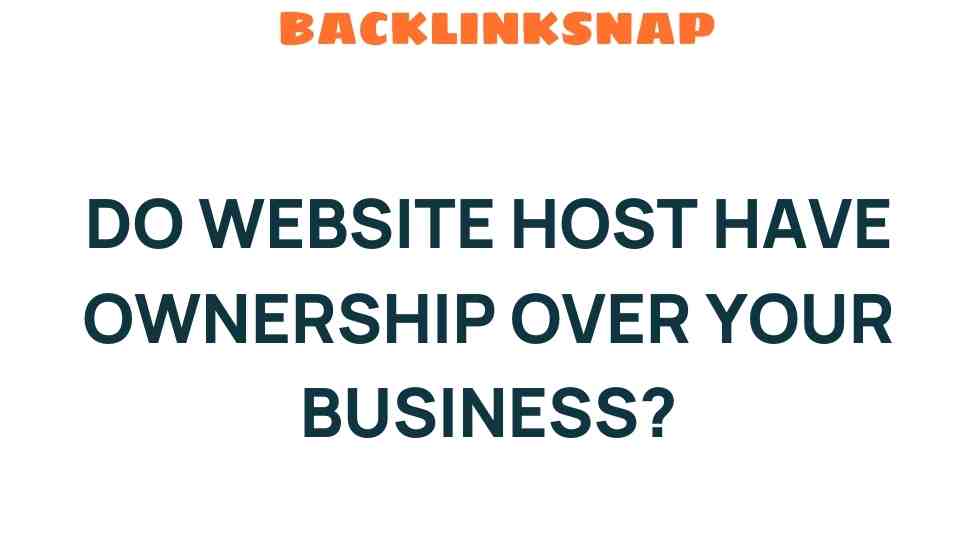Do Website Hosts Hold Ownership Over Your Business Assets?
When you launch a website, you embark on a digital journey that can significantly impact your business’s success. However, this journey often raises an essential question: do website hosts hold ownership over your business assets? Understanding the nuances of website ownership, hosting agreements, and digital assets is crucial for maintaining control over your online presence. In this article, we’ll explore the relationship between website hosts and your business assets, shedding light on data rights, intellectual property, and ensuring you retain control over your digital assets.
Understanding Website Ownership
Website ownership refers to the legal rights you have over the content, design, and functionality of your website. When you create a website, you typically own the intellectual property associated with it, including text, images, videos, and any custom software developed for it. However, the hosting service you choose can complicate matters.
Website hosts provide the infrastructure needed to keep your website live and accessible on the internet. While they offer essential services, it’s vital to understand the implications of hosting agreements regarding ownership of your digital assets.
Website Hosts and Their Role
Website hosts are companies that store your website files on their servers and make them accessible to users across the globe. These hosts offer various services, including:
- Storage of website files
- Domain registration
- Security and backup services
- Technical support
While they provide these services, it’s crucial to note that hosting your website does not equate to owning it. In many cases, the terms of service or hosting agreements you sign can influence your rights over your website and its content.
Hosting Agreements and Business Control
When you sign up for a hosting service, you enter into a hosting agreement. This agreement outlines the terms and conditions of your relationship with the host, including ownership rights. Here are some key factors to consider:
- Data Rights: Most hosting agreements grant you the rights to your data, but some clauses may limit your control. Always read the fine print.
- Termination Clauses: Understand what happens to your data if you decide to switch hosts. Will you still have access to your digital assets?
- Content Ownership: Ensure that the agreement specifies that you retain ownership of the content you upload to your site.
Being aware of these aspects ensures that you maintain control over your business assets. When in doubt, consult with a legal expert to clarify any ambiguous terms in your hosting agreement.
The Importance of Intellectual Property
Your website is a manifestation of your brand, and the content therein is often protected by intellectual property laws. This includes copyrights, trademarks, and trade secrets. Here’s how these laws affect your ownership:
- Copyrights: Automatically protect original works of authorship, including written content, images, and videos.
- Trademarks: Protect brand names and logos, ensuring that your business identity remains yours.
- Trade Secrets: Protect confidential business information, such as marketing strategies or proprietary algorithms.
Even if your website is hosted on a third-party server, you retain the rights to your intellectual property. However, hosting agreements should not infringe upon these rights. Ensure that your host respects and acknowledges your ownership of intellectual property.
Maintaining Control Over Your Digital Assets
To protect your business assets, follow these best practices:
- Choose Reputable Hosts: Research hosting companies to find those with positive reviews and transparent policies.
- Read Your Agreement: Don’t skim over the hosting agreement—understanding it is crucial for your control.
- Regular Backups: Always back up your website data independently. This ensures that you have copies of your digital assets, regardless of your host.
- Consult Legal Experts: If you’re unsure about ownership rights, seek legal advice to protect your interests.
By taking these steps, you can ensure that your website remains a true reflection of your business, free from the worries of losing control over your assets.
Frequently Asked Questions (FAQs)
1. Can a website host take my website down?
Yes, if you violate the terms of service outlined in your hosting agreement, your host may have the right to take your website down. Always adhere to their guidelines to avoid this.
2. What happens to my data if I switch hosts?
Typically, you should have access to your data when switching hosts, but it’s vital to check your current hosting agreement for specific clauses related to data transfer.
3. Do I own the content I upload to my website?
Generally, you retain ownership of the content you upload as long as your hosting agreement does not state otherwise. Always verify this in your agreement.
4. Can I host my website elsewhere in the future?
Yes, you can move your website to a different host. However, ensure that you have backups and understand the process of transferring your site.
5. What if my host claims ownership of my intellectual property?
If your hosting agreement claims ownership of your intellectual property, consider seeking legal advice, as this could be a violation of intellectual property laws.
Implement security measures such as strong passwords, SSL certificates, and regular backups to safeguard your website, regardless of your host.
Conclusion
Understanding the relationship between website hosts and your business assets is vital for maintaining control over your online presence. By recognizing the nuances of website ownership, hosting agreements, and intellectual property rights, you can protect your digital assets effectively. Always choose reputable hosting services, read agreements carefully, and consult legal experts when in doubt. With the right precautions, you can navigate the digital landscape confidently, ensuring that your business flourishes in the online world.
For more insights on website management and ownership issues, feel free to check out our resources here. Additionally, learn more about intellectual property rights in the digital age here.
This article is in the category Digital Marketing and created by BacklinkSnap Team




